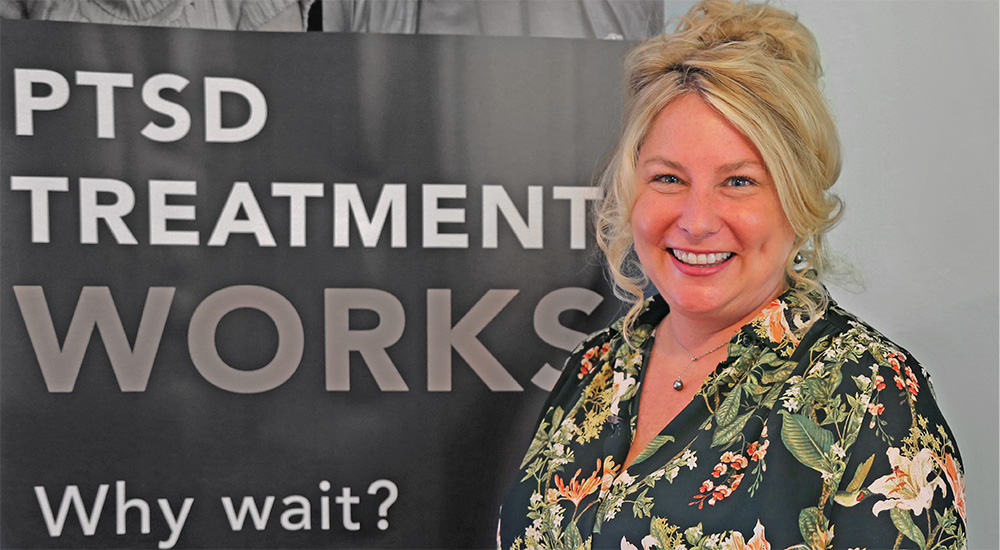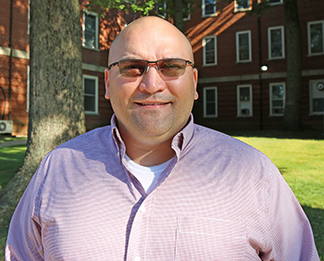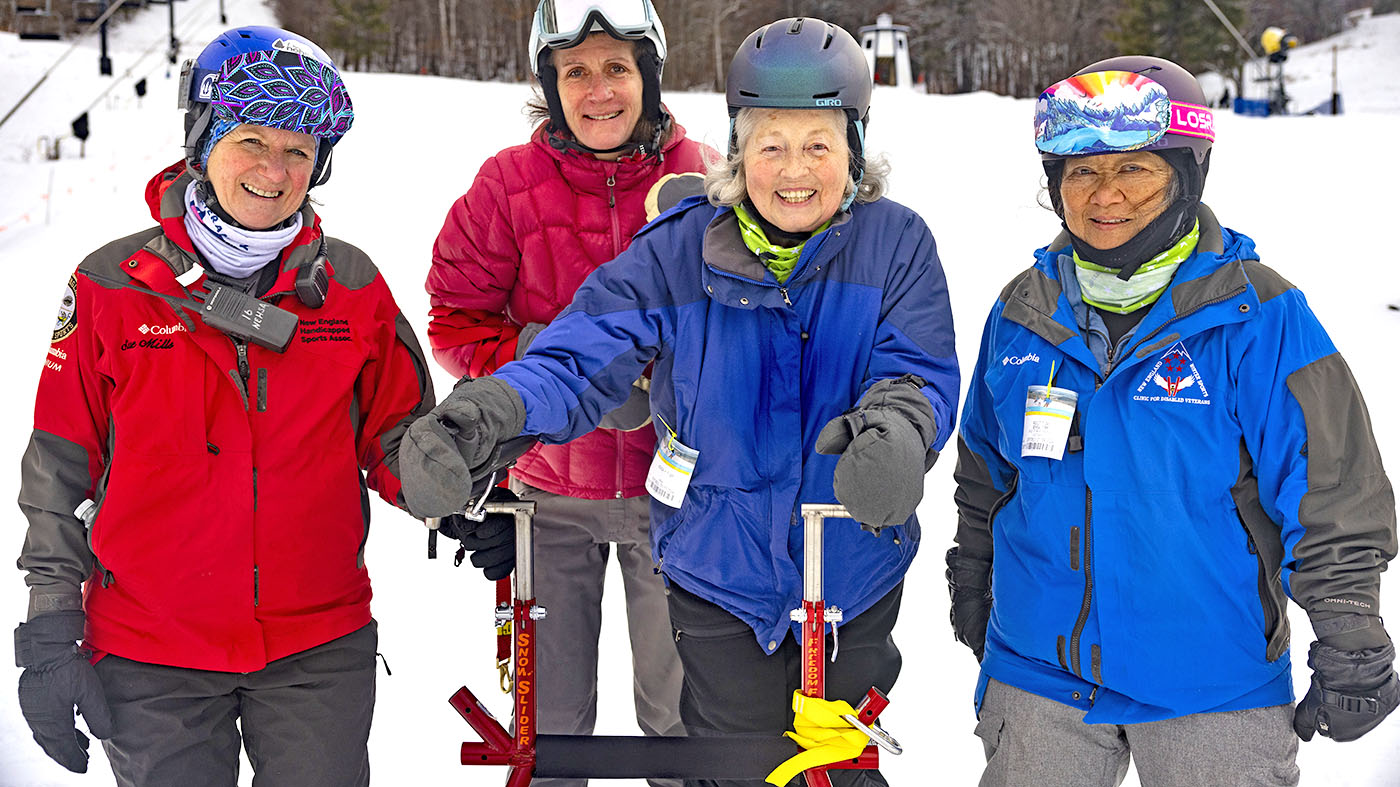Veterans seeking treatment for post-traumatic stress disorder (PTSD) at Coatesville VA are finding success through measurement-based care (MBC) practices.
Army Veteran Curtis Hopp was introduced to MBC when he sought help for his PTSD at Coatesville VA more than two years ago and says he found the questions, essential to MBC, helpful. That is when he realized, “This is not how I want to be. The program presented me with the opportunity to be honest with myself.”
What measurement-based care looks like
Once in Coatesville VA’s PTSD program, Veterans routinely fill out surveys based on the symptoms identified during their consultation. That information guides the conversation with each Veteran. Clinicians discuss their findings with the Veteran and agree on the course of treatment.
The surveys also let the clinicians know where the current treatment plans are working or whether they need to adjust treatments to help Veterans like Hopp get back on track.
VA psychologist Dr. Kristine Sudol serves as Coatesville VA’s PTSD Care Team Director and works directly with the National Center for PTSD as a regional mentor and point of contact who oversees the local implementation of PTSD-related Measurement-Based Care at the facility.
Sudol, pictured to the side and right, also serves as a Cognitive Processing Therapy and region consultant. CPT is a core component of the Veteran PTSD treatment program.
“In the past, patients could be engaged in treatment for long periods of time without really ever knowing how they were doing,” explained Sudol. “Evidence-based psychotherapy and measurement-based mental health care practices allow clinicians to have goal-based meaningful conversations with Veterans to track their progress over time.”
Learn more about MBC at the Office of Research & Development website.
“PTSD was an anchor dragging me down.”
Hopp joined the Army at the age of 18 and deployed twice in support of Operation Iraqi Freedom where he was engaged in combat as an Infantryman. After leaving active duty, Hopp wanted to stay close to family and returned to Pennsylvania, making a point to always be present at family events.
Unfortunately, over the next 12 years, Hopp continued to rely on the techniques that proved effective for him in combat, but rather than help him reconnect with his family and thrive in the civilian world, they did more to isolate Hopp from his family and friends. “I have always, always been at family events but just kind of a shell,” explained Hopp. “I was there for other people but not emotionally invested. I just didn’t want to invest the energy and emotion.”
Hopp found good work and earned his bachelor’s degree from Penn State. In 2014, he secured a job in financial services. “Whether I was drinking excessively to self-medicate or whatever, I’ve always been able to hold myself accountable, to push myself and make sure I’m accomplishing things and progressing.”
While Hopp was outwardly successful in achieving his goals, internally his behaviors were distancing him from his friends and family and eroding his support network. “It was like going through life dragging an anchor,” said Hopp. PTSD was just holding me back, weighing me down.”
The catalyst to reach out
After 12 years, Hopp finally decided he needed to try something different and decided to reach out for help two years ago.
“The birth of my son was actually a catalyst for me to seek out a higher level of help. I was having trouble connecting and expressing my emotions. I was determined to do something, and I was tired of living that way,” he said.
Hopp completed his PTSD treatment program this past summer and reflected on what it meant to him. He said the change it has brought to his life is more important than any college degree or financial professional designation.
“I’m able to experience the full spectrum of the joys that that come with parenthood and fully be in tune with my emotions and the gratitude that I can express from having close relationships with the people in my life,” he added.
If you are a Veteran or know a Veteran who has experienced or witnessed a life-threatening or traumatic event and could benefit from PTSD treatment programs, talk to your primary care team.
Topics in this story
More Stories
Spinal cord stimulation implantation helps Veterans suffering from chronic pain improve their quality of life without narcotics.
After Addison’s Disease and lumbar spine surgery, nurse Veteran Gayle Smith re-learned how to ski. “You have more courage than you think.”
Follow these 10 winter safety tips to stay warm, safe and protected during the cold winter.








I lived that way for 50 years after Vietnam. While my PTSD therapy was a different approach, it helped me recognize my triggers which gives me time (in most cases) to properly respond to the triggers.
I had to fight for mine for almost 45 yrs. In 2015 , I was diagnosised with PTSD. During the almost 45 yrs. I got ignored and had to prove it and NCIS had all the information. Now my case is now being reopened and told the information already on paper and in the system. I still have to wait 120 days. The sysatem is slow.
I left the Army Military Service with PTSD REAL BAD,. Two years later was in a rehab facility. The Military WITHHELD all my medical records “intentionally “ until 2016. My oldest son used at 47 years old because of the Agent Orange I ingested, inhaled, drank, and bathed in, and was medivac’d out of Vietnam under a misdiagnosed condition, and the VA won’t correct it. The VA says nothing happened in the service, but finally service connected me after 45 years. My claims in April 1983 went directly to denied and my medical records remained withheld. Forty years of back pay withheld, 40 YEARS. INshould have been medically discharged because of my P-3 Permanent Profile and my conditions, but the VBA and VA deny me justice. They are waiting me out until death. No JUSTICE for MALE Vietnam Veterans still. WHY, WHY, Why???